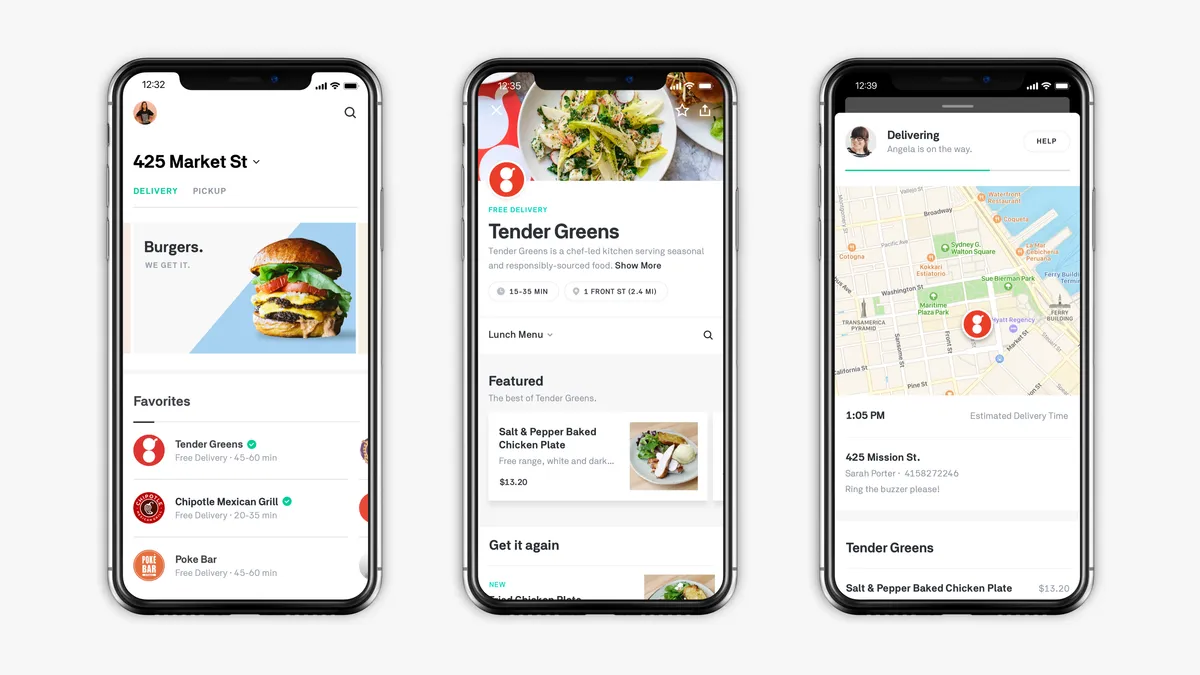Dive Brief:
- Postmates announced Tuesday that it's created a fund that will credit its delivery fleet for the costs of doctors appointments and other medical expenses related to COVID-19, according to a company release. Postmates couriers who have made at least one delivery in the last two weeks in 22 affected states will be eligible for a credit from the emergency relief fund, which can be deposited toward the platform's health savings program. Postmates couriers who aren't registered with the company's health account can sign up for emergency credit relief, no diagnosis or quarantine necessary.
- For restaurants, Postmates will waive commission fees for new partners in San Francisco, a market heavily affected by novel coronavirus, as part of a Small Business Relief Pilot. The company will monitor other markets to potentially expand the offering beyond San Francisco to other affected cities.
- "Now is the time to put aside the politics of the gig economy and work with all stakeholders to develop creative and meaningful emergency support for frontline workers who may be exposed — it's the right thing to do," Vikrum Aiyer, VP of public policy for Postmates, said in the press release. "We know that two-thirds of the individuals that carry out deliveries through the Postmates app have health care, but we want to make sure anyone can afford preventative expenses."
Dive Insight:
Postmates appears to be the first U.S. delivery platform to launch new benefits in response to the rapid spread of novel coronavirus, and it's wise to make its initiative a two-pronged approach.
Covering coronavirus-related medical expenses for its delivery fleet and simultaneously offering free delivery to new partner restaurants in San Francisco stabilizes the company's outlook amid widespread market uncertainty over COVID-19's impact. The medical initiative could keep couriers healthy and secure enough to continue completing deliveries. This will be crucial since analysts predict a significant uptick in food delivery orders as consumers avoid public places like restaurants or self-quarantine for weeks on end.
This medical initiative follows announcements from Darden and McDonald's that the companies will offer paid sick leave to their workers. McDonald's will pay employees at its corporate-owned stores that are quarantined due to coronavirus for up to 14 days, and already offered five days of paid leave across the majority of its network, a McDonald's spokesperson told Restaurant Dive. Darden's plan offers its 180,000 hourly workers an hour of sick leave for every 30 hours worked. New Darden employees will be able to start using accrued sick leave after 90 days on the job, but current employees have immediate access to a bank of sick leave going back 26 weeks, Darden spokesperson Rich Jeffers told Restaurant Dive. Unlike McDonald's, however, Darden's plan had been in the works before the outbreak, though the situation accelerated the rollout, Jeffers said.
Postmates' initiative could kickstart a wave of similar medical credits across the delivery space as coronavirus spreads, mirroring the uptick of paid sick leave in the restaurant space. Without a medical safety net, contracted delivery fleets could choose to preemptively stay home without penalty, aside from personal revenue loss, which could be an obstacle for delivery platforms that don't roll out similar benefits. It already launched a non-contact delivery option where customers have the option of asking a courier to leave food at the door or curbside.
The company's offering to impacted restaurants may help it develop loyalty among new cusomers. Delivery platforms are desperate to grow their networks, which is why so many brands have added nonpartnered restaurants — a move that has sparked widespread backlash from small businesses for companies like Grubhub. But if Postmates can expand by waiving commission fees for restaurants that are struggling to drive in-store sales amid the coronavirus scare, the company could emerge from the crisis with a stronger network. The true test will be if these restaurants stick around once those commission fees kick back in, but the temporary benefits of this method could spur other delivery companies to launch similar offerings.














